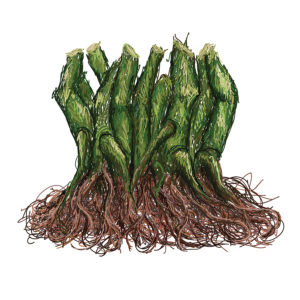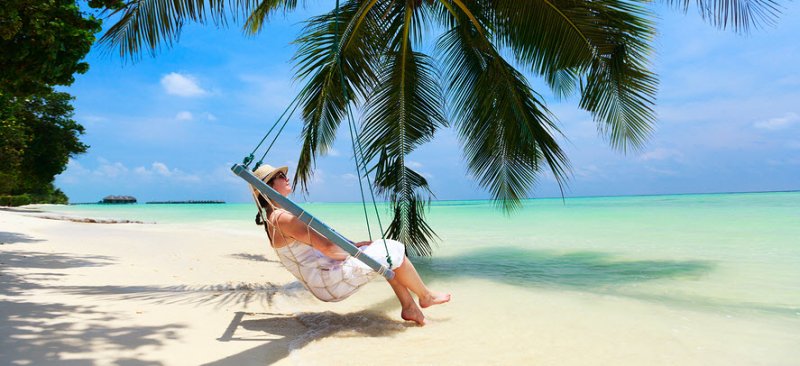Table of Contents
Kava (Piper methysticum) is a small shrub native to the South Pacific islands including Vanuatu, Fiji, Hawaii, and others. And has been safely used by islanders for 3,000 years. Piper methysticum (Piper is Latin for ‘pepper’. And methysticum is derived from the Greek for ‘intoxicating’).
In Polynesia and Micronesia, Kava has been traditionally used as a ceremonial drink. Kava is best known for elevating contentment, mood, well-being and sense of relaxation.
Several clinical studies have found kava to be effective in treating symptoms of anxiety. Other studies have shown kava to help improve sleep quality.
As a nootropic, kava is used primarily to lower anxiety with a potency rivalling some anti-anxiety prescription drugs.
Kava helps:
- Neurotransmitters. Kava affects brain levels of GABA receptors. GABA is the ‘calming’ neurotransmitter. And an increase in receptor sites for GABA accounts for Kava’s anti-anxiety properties.[i]
- Neuroprotection. Kava provides protective effects against strokes. Two of Kava’s compounds, dihydromethysticin and methysticin are similar in potency to Memantine which is used to treat Alzheimer’s Disease.[ii]
- Cognition. Kava improves reaction time and cognitive function. Kavalactones in Kava interact with ion channels in the brain. Influencing neurotransmitter function.[iii]
What is Kava?
Kava (Piper methysticum) is an herb that’s native the South Pacific islands. It’s traditionally been used in the islands as a hypnotic, psychotropic, and anxiolytic (anti-anxiety).

Kava continues to have a central place in everyday life in the islands where its grown. [iv] It’s used as a ceremonial beverage in Fiji where it’s commonly given to the Head of State.[v]
Kava root contains a collection of 6 bioactive compounds called kavalactones (kavapyrones); including kawain, dihydrokavain, methysticin, dihydromethysticin, yangonin, and desmethoxyyangonin. Kava also contains small amounts of other alkaloids, flavonoids and glutathione.
The presence of glutathione seems to reduce the toxicity of some other kavalactones. Standardized extracts are important in deciding on what Kava supplement to buy to ensure reliability and safety.[vi]
The main compounds in Kava readily cross the blood-brain barrier. And reaches your brain in about 45 minutes after taking the supplement.[vii]
How does Kava work in the Brain?
Kava boosts brain health and function in several ways. But two in particular stand out.
- Kava boosts cognition. Kava relaxes the muscles and mind, but it doesn’t affect cognition the way other antidepressants and anti-anxiety drugs do.
After a review of 10 clinical studies of Kava, scientists at Australia’s Brain Sciences Institute at Melbourne University found Kava did not negatively affect cognition. In fact, some studies on Kava showed it “significantly improved visual attention and working memory processes”.
The research team stated that Kava’s “enhanced cognition may be attributed to the ability of Kava to inhibit re-uptake of noradrenaline in the pre-frontal cortex”.[viii]
- Kava relieves anxiety. Several clinical studies have shown that Kava relieves anxiety.
California’s Global Neuroscience Initiative Foundation took a look at 24 studies of Kava and other herbal medicines for anxiety. And there was substantial evidence that kava relieved not only anxiety, but also restlessness and insomnia.
They even looked at animal studies that showed Kava has anxiolytic effects “but not sedative or mental impairing” effects “which are typical side effects caused by benzodiazepines”.[ix]
How things go bad
Chronic stress, anxiety, loss of neuroreceptors and neurotransmitters can damage your brain. And one of the ways this manifests is memory loss.
It comes as no surprise that people with memory loss experience higher rates of anxiety and depression. As verified in one Australian research study.[x]
↓ Chronic stress reduces memory capacity
↓ Bioavailability of neurotransmitters decline
↓ Number of neuroreceptors decline
↑ Increase in anxiety destroys quality of life
Under conditions of chronic stress your brain loses the capacity to transmit signals between neurons efficiently. Memory, cognition, and decision-making all suffer as a result.
Kava benefits
 Kava has a long and proven record of medicinal therapeutic value. Much of the clinical evidence supports the use of Kava in treatment of anxiety.
Kava has a long and proven record of medicinal therapeutic value. Much of the clinical evidence supports the use of Kava in treatment of anxiety.
Unlike benzodiazepines, Kava does not have similar sedative and mental impairing effects. And Kava seems to provide this calming effect by increasing the number of GABA-a receptors.[xi]
Kava extracts have also been seen to bind to GABA, dopamine, serotonin and opiate receptors as well.[xii] This implies that more of each neurotransmitter is available to the brain since their associated receptors are blocked or inhibited by Kava.
Kava extracts have also shown antidepressant effects. Some of the trials demonstrating this effect on depression also noted that Kava raised no safety concerns at the doses and duration studied. Unlike some well-known pharmaceutical antidepressants.
Kava has also been shown to boost cognition and attention. In one study researchers stated that Kava’s “enhanced cognition may be attributed to the ability of kava to inhibit re-uptake of noradrenaline in the pre-frontal cortex…”
And finally, Kava also prevents and may even treat several types of cancer. Research shows for example that one of the components of Kava, Flavokawain B reduces prostate tumor growth and inhibits cancer.[xiii]
And that’s just one of many examples of how different components of Kava can fight cancer in the lung, bladder and other organs.
How does Kava feel?
This can be a little complicated so stay with me. Any particular preparation of Kava will contain up to 18 different kavalactones. Each will have some type of psychoactive effect in your brain.
And to complicate things even more, there are several distinct strains of Kava grown in Hawaii and the South Pacific today. All with their own unique profiles of kavalactones and as a result, their own subtle differences in effect.
In general, supplementing with Kava (Piper methysticum) can make you feel relaxed, enhancing calmness and lowering anxiety while promoting sociability.
Higher doses can generate feelings of gentle euphoria, with greater sedation and mild motor impairment.
Many neurohackers say that at lower doses, Kava’s effects are a little like those generated by alcohol and certain kinds of anti-anxiety medications. Some users say it works as well as popping a Xanax.
You should experience an increase in focus along with a sense of calm. And even though Kava works well as a sleep aid, taking it during the day shouldn’t make you drowsy.
Kava Clinical Research
Kava has a lot of clinical research to back up its reputation as a nootropic. Research studies have been noted throughout this article. Here are two more…
Kava as an anti-anxiety therapy
A study at the University of Melbourne, revealed that Kava could be an alternative treatment for those suffering from Generalized Anxiety Disorder (GAD).
In this 6-week placebo-controlled, double-blind trial, 75 patients with clinically diagnosed GAD were given Kava or a placebo.
Participants were given Kava extract tablets twice per day for a total dose of 120 mg kavalactones for the first 3 weeks. In cases of non-response, the dose was increased to a double-dose twice per day for the 2nd three weeks of the trial.
γ-Aminobutyric acid (GABA) and noradrenaline transporter polymorphisms were analyzed as potential pharmacogenetic markers of response. Reduction in anxiety was measured using the Hamilton Anxiety Rating Scale (HAMA) as the primary outcome.
Kava was well-tolerated. And results showed no significant differences in liver function. One interesting observation during this study was that subjects who had genetic differences in GABA transporters modified their response to Kava.
At the conclusion of this trial, 26% of the Kava group were considered in remission for their anxiety symptoms compared to the placebo group. Overall, all participants who received Kava, showed a significant reduction in anxiety levels.
And one additional finding of this study was that Kava increased the female participants sex drive.[xiv]
Kava enhances cognitive performance
Researchers conducted a double-blind, placebo-controlled trial with healthy volunteers. The purpose of the trial was to investigate the effects of Kava on emotions and cognitive performance.
One group was given a single dose of Kava extract (300 mg). And that single dose led to an increase in “cheerfulness”, improved accuracy and speed in task performance, increased visual attention and a boost in short-term memory.
The research team compared the effects of Kava to conventional benzodiazepine-type anxiolytics which tend to impair cognitive performance. The team concluded Kava is a potent anxiolytic agent which can boost cognitive function.[xv]
Kava Recommended Dosage
Kava extracts are made with a variety of different strengths, and from different source plant material. So it’s difficult to recommend exact dosages.
Fortunately, Kava is relatively forgiving as far as dose is concerned. So taking 2-3 times the recommended dose of an extract should cause no issues.
Some neurohackers claim that extracts are just not strong enough. And the only way to get the full effect of Kava is to use ground Kava root which can be found at some natural food stores. Make sure it smells fresh (it should have a relatively strong smell).
Fresh powder is used to make a cold tea by making a cold water extraction. Fresh powder is soaked in cold water for 15-20 minutes or more, stirring or shaking occasionally. You can then strain out the powder if you like.
If you want to go the capsule route, look for a Kava extract called “WS1490”. For anxiety and other cognitive issues use 300 mg of this extract daily. Preferably split into three 100 mg doses. One dose in the morning, one early afternoon and the last in the evening.
You can also choose a Kava extract supplement with 250 mg total kavalactones. You can use this multiple times throughout the day. If you use only a single dose, take it just prior to sleep.
Kava Side Effects
Kava has a long and proven track record of medicinal therapeutic value. But if you start doing research on Kava, you’ll see reports of possible liver toxicity. Let’s address this right now.
Most research shows there is little to no evidence to support this notion of liver damage when using Kava. For example, one large review out of the University of Melbourne included 24 clinical studies.
One of the researchers stated, “Of the 435 clinical trial participants taking Kava supplements in our review, some at high doses, no liver issues were reported. Therefore, the current review supports the conclusion that liver toxicity is indeed a rare side effect.”[xvi]
For most of the history of the Kava industry, it’s been harvested and prepared by native, Pacific Islanders. Roots are stored in bulk after harvest. And could develop mold or acquire other contaminants.
Increasingly, many Kava suppliers harvest and process their Kava using international manufacturing standards such as ISO, GMP and others. And because of the restrictions by first world countries (esp. the European Union) on the importation of raw ingredients, these protocols are now stricter.
So when selecting a Kava product, make sure the manufacturer is adhering to good manufacturing practices.
Long-term heavy and consistent consumption of Kava could cause a scaly skin rash called dermopathy. This is reversible when Kava use stops.
And finally, Kava should not be mixed with prescription drugs. Don’t use Kava if you’re pregnant or breastfeeding. Kava use may make you unable to drive (similar to alcohol). Don’t use Kava if you have liver problems. And avoid combining Kava with Xanax, clonazepam, lorazepam, phenobarbital, and Ambien.
Type of Kava to buy
In the South Pacific, whole Kava root are chewed for their medicinal value.
Kava is also available in liquid form, as tinctures, and standardized extracts as capsules or tablets.
Nootropics Expert Recommendation
Kava extract 250 – 500 mg per day
 I recommend using Kava as a nootropic supplement.
I recommend using Kava as a nootropic supplement.
Your body does not make Kava on its own. So you must take it as a supplement.
Kava is especially helpful for those suffering from anxiety and stress. Studies show it helps stop and reverse the devastating effects of anxiety and stress in your brain, and body.
Kava also has a reputation for lifting mood. And doesn’t have the same side effects as prescription antidepressants.
And unlike pharmaceuticals like benzodiazepines, Kava boosts cognition and short-term memory.
The usual serving of prepared Kava in the South Pacific is 2-4 fluid ounces. Depending on how its prepared, a bilo (coconut half shell) can contain anywhere from 150 – 500 mg of kavalactones. And native islanders often consume several bilos in a Kava drinking session.
Although the local Kava Committee has issued an advisory upper limit of 300 mg of kavalactones per day, many Pacific islanders consume far more, without any ill effects.








Join The Discussion - 73 comments
m
January 14, 2020
Do you ever recommend brands? I can’t find the WS1490 version.
David Tomen
January 15, 2020
M, the brands I trust to do the testing are Gaia Herbs: https://amzn.to/2TqIckV, Now Foods: https://amzn.to/2NxjNGO, Natrol: https://amzn.to/2Nr0UVF, or Source Naturals: https://amzn.to/2QTRwfs. But you’ll need to do some math to figure out how to get 250 mg total kavalactones in each dose for it to be effective.
Chelsea
October 28, 2019
Can you take Kava alongside St John’s Wort? Many thanks
David Tomen
October 29, 2019
Chelsea, I don’t recommend it because both of these nootropics affect GABA.
Galya Campano
September 16, 2019
SUBJECT: Kava & Weight Gain
Hi, David,
First of all, I thank you for the abundant and useful information on this “Nootropics Expert” website. I appreciate it very much.
I have something to share regarding Kava. (If Kava is the same as “Kava Kava”).
I have suffered from chronic insomnia for several decades–mostly Insomnia Type 2. (inability to STAY sleep.) A few months ago, upon the advice of a relative, I began taking Kava every night. Soon, I began to wake up rested and energized–as I had not felt for a long time. I was thrilled!
However, 4 weeks later, I realized that Kava was making me GAIN WEIGHT. [Since May of 2017, when I began my successful low-refined-carb weight loss nutritional plan, I keep a diary of foods, supplements, exercise, etc. I discovered that the week that I began to take Kava was the 1st of 4 weeks of consistent weight gain (unique in previous 1.75 years); I stopped the Kava; the following week, I had gone back down about, 1.5 lbs., to a weight more like my “normal” weight.]
Because of the impact on weight, I will no longer take it on a regular basis; however, I WILL take it on special occasions–when I want to hedge my chances of getting better sleep for that one night. (I took it one night last week–and it appears to have worked!)
I highly recommend it to anyone who experiences poor sleep–and who may be desperate to get one or two days of better sleep.
I hope this helps someone.
Ali
July 28, 2019
Hallo David
I want to know the best supplemment to cure ED
Thanks
David Tomen
July 28, 2019
Ali, depending on what’s causing ED, there is not really any “cure”. But likely the simplest daily solution for ED is 6,000 mg of L-Arginine with 1-2,000 mg of L-Citrulline.
Serge
July 17, 2019
Hallo David
That mean valerian can help treat premature ejaculation.
Thanks
David Tomen
July 17, 2019
Serge, I said “possibly” because while Valerian affects serotonin in parts of the brain I’m not sure if it specifically affects the areas responsible for PE. You’d need to try it.
Serge
July 13, 2019
Hallo David
I hear that kava can cure premature ejaculation is it true of do you know what more to cure?
David Tomen
July 13, 2019
Serge, Kava likely won’t help PE because it Kava works primarily on GABA.
Premature ejaculation seems to have something to do with serotonin and its receptors. For a deep study on PE which is a challenge to read: https://www.ncbi.nlm.nih.gov/pmc/articles/PMC2671940/
Drugs that seem to be effective are primarily serotonin 5-HT2C receptor agonists. For example; Paxil (Paroxetine), Anafranil (clomipramine), and Zoloft (sertraline).
So we’re looking for natural nootropics that are 5-HT2C receptor agonists as well. You can try these:
Cat’s Claw – https://nootropicsexpert.com/cats-claw/
Valerian (possibly) – https://nootropicsexpert.com/valerian/
Angie
July 3, 2018
My son has been using Kava to help with anxiety but has recently come across studies showing Memantine helping with anxiety. What do you know about Memantine? Can you give advice on this?
David Tomen
July 3, 2018
Angie, memantine is a prescription drug used to treat Alzheimer’s Disease. It was developed by Eli Lilly & Co. in 1968.
Kava has been used for over 3,000 years for mood and anxiety with the added benefit of improving cognition.
So it’s a choice between a pharmaceutical with potential side effects. Or a natural nootropic with a proven track record.
Angie
July 3, 2018
Thank you! Any suggestions as to what else may help besides Kava, when getting off of Phenibut?
David Tomen
July 3, 2018
Some have reported that Phenylethylamine (PEA) helped kick the habit of Phenibut or caffeine without going through withdrawal: https://nootropicsexpert.com/phenylethylamine/
kava enthusiast
November 17, 2016
Do you find any negative side effects with kava/.? I just started using it and havent experienced any yet but am curious.
David Tomen
November 18, 2016
You shouldn’t experience any side effects with Kava as long as you stay within recommended dosage limits. And don’t combine it with prescriptions meds. Final bit of advice is know where your Kava is coming from, who processed, and that’s it’s pure Kava.
nico
January 15, 2020
Thank you David for your answer.
It’s noble kava from one of the most respected vendors out there. Is it possible that the ADHD stack (based on yours), which I started recently, has an effect on my meds (the equivalent of Adderall)?
Its effects are much less pronounced than normal. I’m about ten days in. The only ingredients that differ from the stack on the site are Lion’s mane and Ashwagandha. But I have used variations of the stack before and never ran into in problems so that seems highly unlike. If anything; I should get around with less.
The reason I was thinking about the kava is because of this (once again; thanks for the incredible well-informed articles) part;
Kava extracts have also been seen to bind to GABA, dopamine, serotonin and opiate receptors as well.[xii] This implies that more of each neurotransmitter is available to the brain since their associated receptors are blocked or inhibited by Kava.
So this is basically what an ssri does in regards to specific serotonin receptors? Or Ritalin? So having a cup of kava in the evening (or during the day) should actually make your medication work better? I know we’re probably talking about very marginal gains and am not planning anything in that nature. I’m merely trying to understand what’s going on. I eat very healthy, to little exercise – that’s for sure, I get a decent amount of sleep. The only medication I take is something I have been since my late teens.
It’s very frustrating because I want (need) a balanced and structured schedule and am dedicated to find one that works with minimal use of pharmaceuticals. But as the light went on for you, something inside me decided to turn it off (Temporary I hope – and I have had episodes like this before). There are parts of my job where I don’t need any medications because it’s fast-paced, answering questions, making sure everyone knows what to do – in chaos I have oversight. But then there are periods where I have to write. I have been a little down lately. But when I’m one happy camper everything is floating around in my head like leaves on a windy day … Between thought and expression lies a lifetime. It’s the expression part that’s nearly impossible at the level I work.
Could it just have to do with being down, not depressed, just a kind of hopeless feeling … I know that’s all it is. It’s feeling and it’ll pass. It’s like a cycle; fall, winter …
There’s not really A question but if you have any ideas I would be very eager to hear them.
Keep it up!
David Tomen
January 16, 2020
Nico, your comment about SSRIs, serotonin, Ritalin and Kava has merit. The only way to know is trial and error and experiencing its effects.
But your right that there are many other causes of feeling down occasionally. Including lack of light in the winter and not enough vitamin D.
Or you’re not stimulating your dopamine/motivation pathway which could also result in feelings of hopelessness. More on that here: https://nootropicsexpert.com/hacking-motivation-with-nootropics/